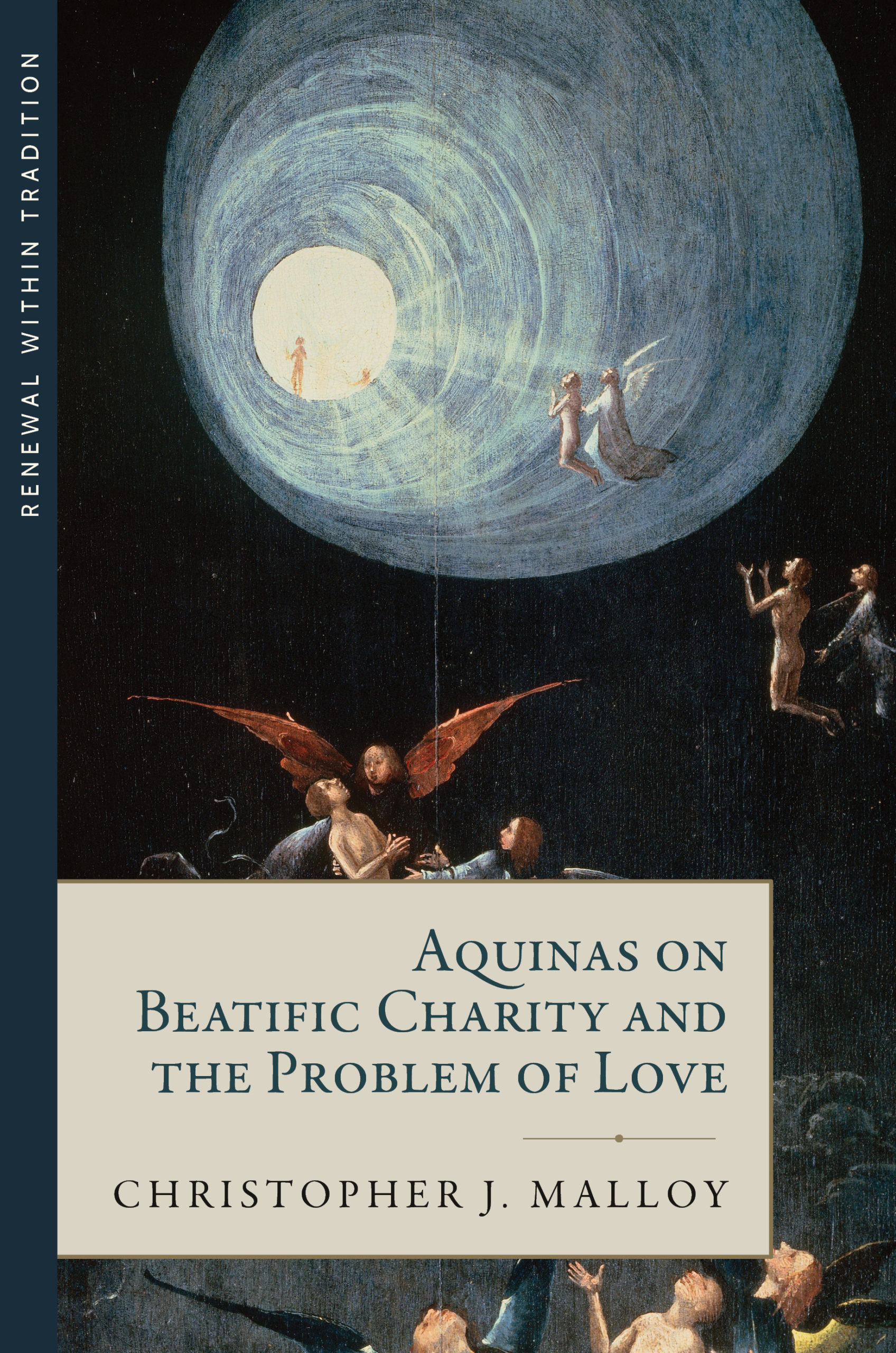Christopher J. Malloy’s Aquinas on Beatific Charity and the Problem of Love examines the relationship between the desire for happiness and the love of another, chiefly, the love of God for His own sake. Great thinkers judge the matters connected with this problem differently. Aristotle and others contend that the desire for happiness grounds ethical activity. Others contend that a pure love of God (or of the “other”) is not founded on desire for happiness. The former charge the latter with leaving love groundless, and the latter charge the former with reducing love to egoism.
Aquinas’s appreciation of the Aristotelian tradition is forefront in his classic treatment of human action, which begins with the desire for happiness. Accordingly, many readers, proponents and critics, read Aquinas as simply “eudaimonistic.” There are, however, other principles at work in his thought; these suggest a simple but profound difficulty in his thought, one reflective of the subtlety of real life. Are the two sets of principles contradictory? Juxtaposed?
Considering beatific charity as the ultimate lens for this problem, Malloy proposes that Aquinas’s texts and principles are hierarchically harmonious while developmentally complex. They indicate that love of happiness has a foundational role in human action and that love of God for His own sake has priority in the order of finality. This ordered balance depends upon a conception of the common good in accord with a metaphysics of participation: as having existence and formal perfection from and in likeness to the One Who Is, created persons incline to love God more than and more intensely than themselves. Thus, love of the Divine Other, while indeed the supreme love, especially as deified through charity, does not demand “disinterested” love. God truly is man’s good: His true lover longs to be with Him.
About the author:
Christopher J. Malloy is Associate Professor of Theology at The University of Dallas. He specializes in theological anthropology, Trinitarian theology, and ecclesiology. He has published one monograph and numerous articles in journals such as Freiburger Zeitschrift für philosophie und theologie, Josephinum, The Thomist, Nova et Vetera, and others. Malloy strives to disciple Thomas Aquinas, who sought to contemplate the real things. He grounds theological reflection in the sources of revelation and draws assistance from the perennial philosophy. He maintains a blog at TheologicalFlint.com.
Endorsements:
“In Aquinas on Beatific Charity and the Problem of Love, Chris Malloy tackles head on an apparent dilemma that has long tormented Western consciousness: Can I truly love God for Himself and above all created things if I search in Him my own happiness? His sound answer is based on a close analysis of St. Thomas Aquinas’s texts, in constant dialogue with the best contemporary scholars. It illuminates the non-competitive conception of love for God and self-love in the light of the metaphysical doctrine of participation and in the context of the Thomist conception of the harmonious articulation between nature and grace. By focusing on charity in its glorious phase, Malloy opens a fresh perspective on an old problem.”
Serge-Thomas Bonino, O.P., President of the Pontifical Academy of Saint Thomas
“Christopher Malloy’s study belongs to the highest level of contemporary scholarship concerning what Pierre Rousselot influentially describes as the problem of love. The problem concerns both the interpretation of medieval debates and the perennial importance of these debates for our understanding of charity. Professor Malloy is keenly aware of these two facets of the problem and handles them deftly. His analysis of Thomas Aquinas’s theology of love engages the best of the secondary literature and outlines the contemporary interest of Aquinas’s theology. The book is a welcome addition to scholarly debates on this problem.”
Michael Sherwin, O.P., University of Fribourg
“A worthy addition to this series! The topic of this book is important, and throughout Malloy is attentive to the key claims offered by Aquinas about love and charity, unpacking them in methodical fashion in the company of such stalwarts as Mansini, Sherwin, and Gallagher. Where need be Malloy, himself a systematic theologian, can engage as well in speculation, but he is, as is appropriate, unfailingly modest and reserved in thus moving the argument forward, always seeking to be faithful to Aquinas. Readers may well disagree with specific points of exegesis; but all will benefit from this sustained reflection about the compatibility of the ‘love of beatitude’ and the love of God above all things, for God’s sake.”
Joseph Wawrykow, University of Notre Dame

Reviews
There are no reviews yet.